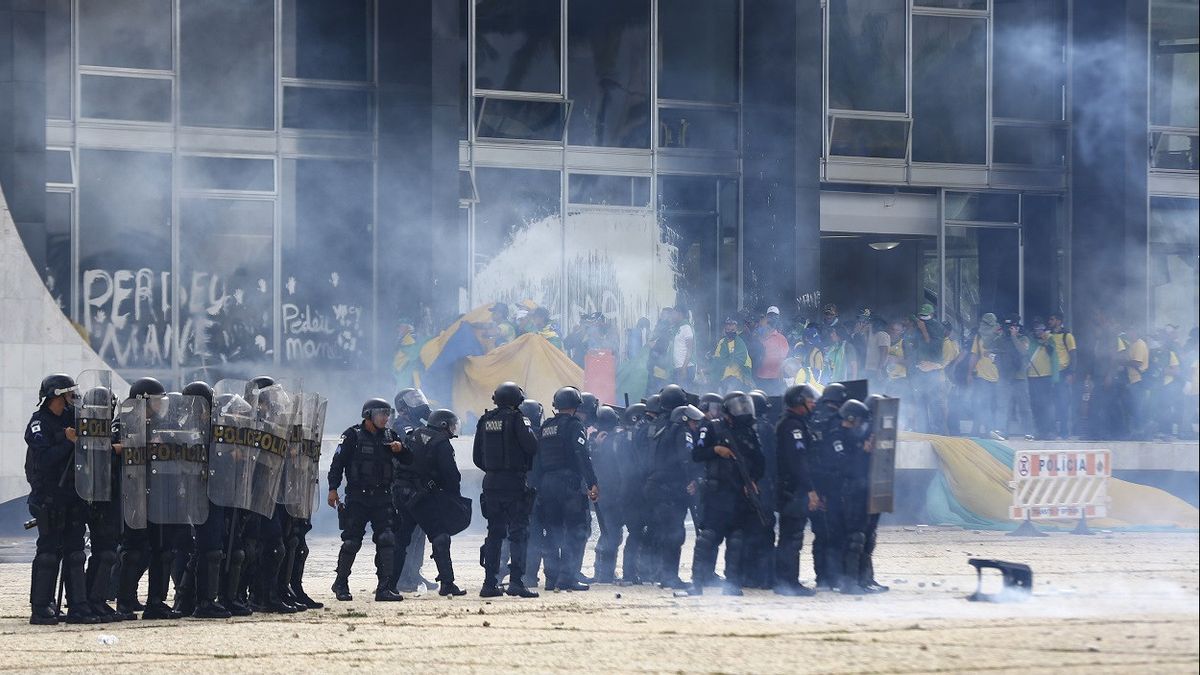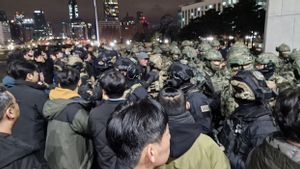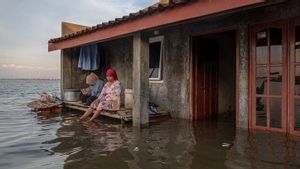JAKARTA - The world was shocked when thousands of supporters of former President Jair Bolsonaro stormed Congress, Supreme Court and the Brazilian presidential palace in the Brazilian capital last weekend.
The raid, which was followed by vandalism inside the building, shouted false accusations that the Brazilian election had been rigged, with Bolsonaro supposed to be the winner, as if repeating a similar incident when former President Donald Trump's supporters stormed Capitol Hill on January 6, 2021.
The raid was set in such a way, by utilizing social media to spread claims of election fraud to a row of codes that were later identified as 'coordinates' prior to the raid in Brasilia, reported by the BBC Jan. 11.
In recent months, Bolsonaro's supporters have spread conspiracy theories online, pushing for the idea that the former president is the real winner of the election, not Luiz Inacio CLA da Silva. The BBC found no evidence of the claim.
In the days leading up to the attacks on the Brazilian Congress, rhetoric is getting more intensive and includes a series of covert metaphors. The main thing is an invitation for Brazilians to attend the 'Private Party'.
'Selma' is a play on the word'selva', which means forest in Portuguese, and is also used by the Brazilian military as a greeting or call for war.
Four days before the riots, a video of a 'circular party' went viral on Telegram's social media app groups. Inside, a man explains the'materials' for the 'party', including Brazilian sugar brands called Union and five large corn brands. Corn is another word game. 'Milho' means corn and'milles' mean a million. The proposal is that five million people are invited to attend the protest.
Another post on social media offers free transportation from various regions of the country to Brasilia. They advertise "free buses" with "all free: water, coffee, lunch, dinner".
The party's metabolism continued on the day of the protests on Twitter, where a video was uploaded showing hundreds of people lined up with long yellow and green banners in Brasilia.
The title reads: "The first guests will arrive... Once everyone arrives here, the cake can be cut."
The use of these codes is considered to avoid bans on sensitive content. It is known, most social media platforms prohibit and remove calls for violence.
In a deleted TikTok video, a woman explicitly says that she no longer talks about politics on TikTok because she doesn't want her account removed. He then talked about a 'Single Party'.
Elsewhere, people are uploading about another 'party', including one for 'Telma' human cousin, in Swady Paolo, and her sister 'Velma', in Rio de Janeiro. For now, the 'party' hasn't had much traction.
According to Arcelino Neto's analysis from the University of Snyadkel Paolo, Festa Dagami first appeared on Twitter on January 5. They have been used by more than 10,000 accounts in tweets shared more than 53,000 times.
The hashtag #festadaselma is used to 'invit' people to appear in a government building complex known as "Pra wayla dos Trwentes Poderes" (Three Powers Square) outside Congress.
On Telegram, the rhetoric is more explicit. Bolsonaro fans asked "hackers and IT experts" to "attack all government systems" and gunmen to "protect the patriots".
They also invited backups from "military and police" to "share the experience of tactics and lead Brasilia's 'fight' and her false government".
Recently, Brazilian authorities have come under scrutiny over the alleged lack of plans to anticipate the crisis.
"The coup was not carried out by the president of Bolsonaro. The coup was not by the Armed Forces. The coup was carried out by the Brazilian people and would be fatal," read another message that was shared days before the raid.
Emillie de Keulenaar, a researcher from Groningen University who monitors the pro-Bolsonaro group on Telegram, has investigated the language used.
He said, after the inauguration of CLA on January 1, small private Telegram groups began to emerge, organizing events in various regions in Brazil.
On January 6, he said the language used became "increasingly aggressive", sparking a "brotherly war". That's when the metaphor began to emerge. He said Bolsonaro fans wanted to avoid "left-infiltrations that they thought would disrupt their plans".
"They used 'Festa daCEin' as code name for the attack, but they also called it 'popular intervention', 'people taking power', or 'general strikers'."
Separately, the role of social media in the unrest is under scrutiny. Since Elon Musk took over, Twitter has laid off staff, including staff in Brazil who play a role in overcoming misinformation around elections. Twitter and Musk have repeatedly said they handle the most harmful content on the site.
This is not the first time online misinformation has triggered a physical attack on democracy. Former Twitter Chief Executive Jack Dorsey acknowledged in a hearing on the US Capitol raid in 2021 that misinformation on social sites played a role in fueling violence.
Meanwhile, Meta, which owns Facebook and Google, the parent company of YouTube, said it removed content praising or supporting anti-democracy protesters in Brazil.
The English, Chinese, Japanese, Arabic, and French versions are automatically generated by the AI. So there may still be inaccuracies in translating, please always see Indonesian as our main language. (system supported by DigitalSiber.id)











